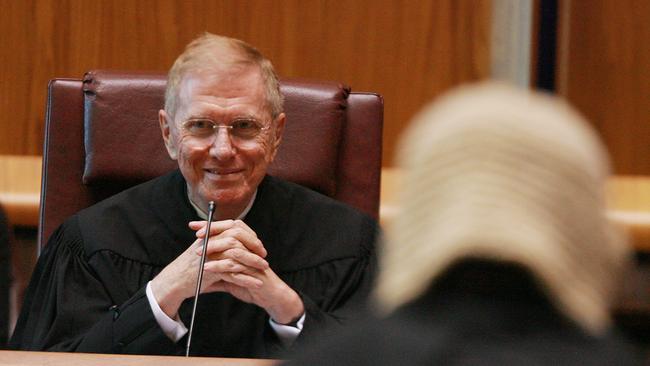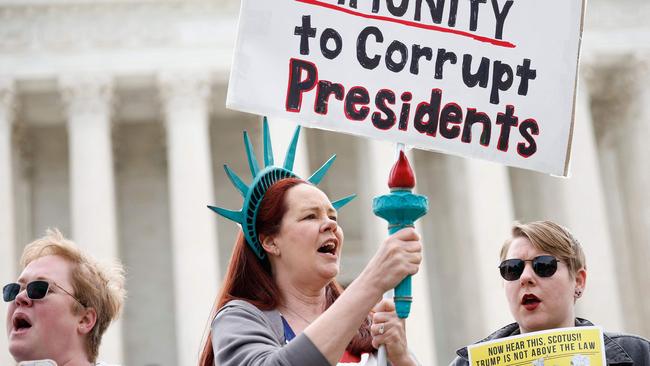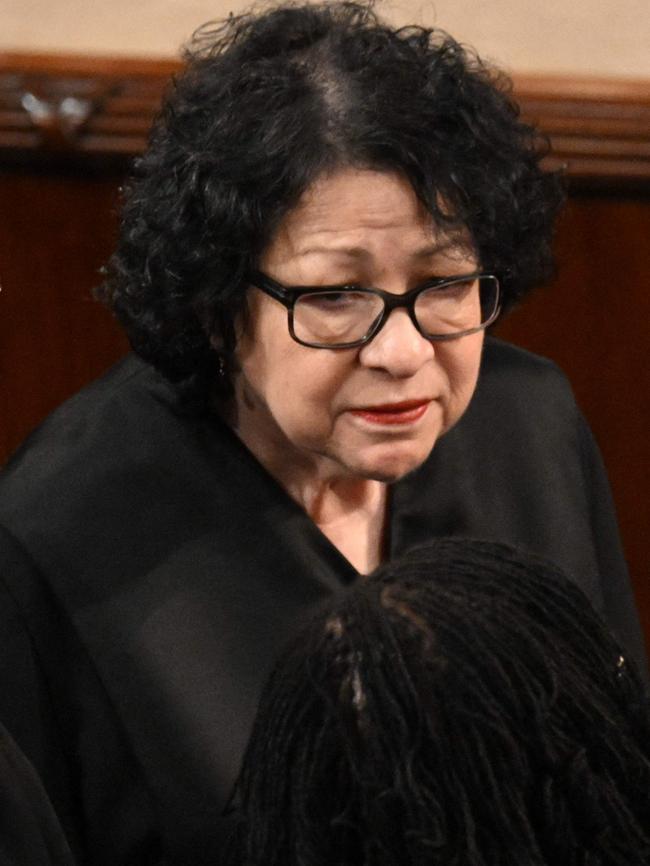
For his supporters, one of Trump’s greatest successes as president was to deliver a more conservative Supreme Court. In office, Trump nominated three judges who have decisively shifted the ideological balance of the court.
Indeed, one of the Supreme Court’s most recent decisions was a real doozy. America’s highest court granted various levels of immunity from criminal prosecution to Trump for actions when exercising core functions of his presidential office.
For those of us who like our judges to be judges not politicians, there was an unmistakeable irony from hyperventilating liberals. Clearly, they’ve forgotten Newton’s Third Law – for every action there is an equal and opposite reaction – applies in courts too.
Having applauded judicial activism of the leftist variety for decades, so-called progressives were apoplectic at what they saw as judicial activism of a right-wing kind. There is a lesson for Australia here. If you want your courts politicised, discredited and regarded as just another bunch of narcissistic politicians, give them political power.
Enter stage left, our own former High Court judge, Michael Kirby. He was out there again, recently touting the virtues of a Human Rights Act. There couldn’t be a more certain way to ensure the generally high standing of the Australian judiciary will sink to the abysmal levels of the US judiciary than following Kirby’s advice – and following the US too – by giving it the kind of powers to make laws or policy, not merely interpret laws or policy made by politicians, that US judges have.

This is not a left-versus-right thing. Judicial activism from the right is every bit as illegitimate and undemocratic as judicial activism from the left. Far better we never embark down this road at all. Keep our judges as legal technicians, rather than transform them into philosopher kings.
Alas, the left in Australia hankers for the latter. Judicial activists want judges to have powers to enact policies lawmakers or activists could never get through an elected parliament.
Impatient for change and unwilling to wait for elected politicians to enact it, the legal activists will greet judges who invent novel new legal duties, for example in relation to such matters as climate change, as modern-day secular saints.
This is what drives the left’s interminable calls for a Human Rights Act or a Charter of Rights. It’s all the same. Every time Labor is in power, it revisits this folly. Sure enough, federal Attorney-General Mark Dreyfus has tabled a report by the Australian Human Rights Commission calling for a National Human Rights Act.
While we’re a long way from seeing a draft bill, we have enough precedents at a state level to know the eventual bill will contain broad, ethereal principles drafted in the most platitudinous and imprecise language possible. This is deliberate.
Woolly, aspirational language devoid of detail leaves judges the broadest possible scope to indulge their inner political desires. Unelected judges with great legal knowledge but next to no economic or policy training, and unfettered by evidence of the political or social implications of their decisions, can enjoy inventing new policy that might make them heroes at their inner-city dinner parties but be a practical disaster.
Even worse, judges are safe from having to worry about the consequences of their social fiddling – they don’t face elections and are almost impossible to sack. Sadly, the only completely certain result is the politicisation of the judiciary and the loss of its legitimacy.
If you doubt all this, return to the US. The US Bill of Rights uses language every bit as flowery and pious as any potential Australian Charter of Rights. The US courts, ultimately supervised by the US Supreme Court, are charged with interpreting it. Their activism is not a distortion of their system; it is a deliberate design feature of the US constitutional set-up.

For decades under the Warren and then the Burger Supreme Courts, the US Supreme Court was an activist’s delight, expanding civil rights, civil liberties, judicial power and federal power. The legendary Roe v Wade ruling, creating a national right to abortion, was but one of many decisions where the court eschewed traditional legalistic methods of statutory interpretation in favour of progressive interpretations introducing policies that legislatures could have introduced but did not.
The court seemed to delight in overcoming the dereliction or downright stupidity (as the court saw it) of legislatures in enacting enlightened policy.
The problem with all this was that while half the country may have cheered all this enlightenment, half the country hated it. Sure enough, Newton’s Third Law outed itself. Conservatives of all stripes united in an effort to get the courts back under control.
Many years ago, after the then Labor government under Kevin Rudd toyed with a charter of rights for Australians, I interviewed US Supreme Court Justice Antonin Scalia. He warned this country to steer clear of America’s mistakes.
He said that once Americans figured out the court was rewriting the constitution from term to term, they wanted someone on the court who’s going to write the constitution that they like. Scalia warned us not to take the American road where every appointment, every decision and their aftermath are bitterly political.
The court’s recent decision on presidential immunity crystallised simmering anger at the change in the court’s philosophical approach. Dissenting liberal justice Sonia Sotomayor typified the existential fear provoked by the majority decision.
She said the decision made “a mockery of the principle … that no man is above the law”, and argued that the decision would allow the president to indulge himself or herself in all kinds of outrageous mayhem free from legal sanction.

While Sotomayor seemed untroubled that presidents have long enjoyed immunity from civil suits for their official actions, and they can face impeachment, the Supreme Court’s extension of presidential immunity for criminal acts does raise real questions.
That said, the critical point is not whether you like or dislike this judgment – or any others. The point is that politicisation of the American judiciary is a deliberate feature of a system that gives courts sweeping power to adjudicate matters of social policy. That politicisation has delivered division, discord and anger. Those features permanently stalk US courts and the American polity.
The lesson from America is that the tables can always turn. Power is seductive, and corrupting. Conservatives can be expected to be every bit as creative as left-wing judges, once they control the bench. They might be more likely to invent new forms of obligation or mutual responsibility than new rights, but invent they will. This is the dystopian future an Australian Human Rights Act will bring.
But never underestimate the ferocious devotion of the legal class to a Human Rights Act. Lawyers, left or right, will love it because it shifts power from parliament to judges, and it will be a massive engine of litigation, possibly the biggest act of lawyer enrichment ever seen.
Australia has a relatively uncontroversial and non-political judiciary – at least by American standards. We should keep it that way by saying no every time a government proposes turning judges into politicians.



As America reels from the attempted assassination of Donald Trump, it pays to remember every significant source of division and anger that is tearing at that nation’s social and political fabric.